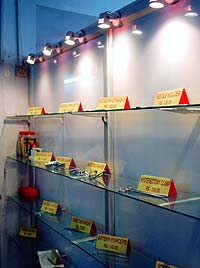Modeling the Surya clinics' prospects, and figuring out how to keep vaccines cold
 A display of instruments that Janani sells to Surya clinic franchisees. (Team Janani photo) |
Our financial model has several components. The first is a "base line" financial model of a franchisee clinic. This looks at both the Surya clinics that will be located in small towns and at the "Super" Surya clinics to be located in cities, which will provide more amenities, such as ultrasound testing. These base-line models show the sustainability of these two typical clinics. Our scenarios take into account patient load (as predicted by local experts and doctors), menu of services, prices, and capital expenditure requirements. Our initial models predict a strong sustainability of the Franchise Surya Clinics and the Super Surya Clinics. The models also have many assumptions that can be changed, thus enabling Janani to view the impact of various scenarios — like raising prices — on a franchisee's financials. In conjunction with this component, we are assessing the indexes to which Janani should link its annual increase in prices.
The second component uses the base model to understand the financial requirements of opening a new clinic. We are assessing different ownership structures for new clinics, including joint ownership between doctors and rural medical practitioners. Under the current structure, the clinics are completely franchised out to doctors. The Patna Surya Clinic is the only clinic that is owned by Janani. It acts as a learning center for the entire organization and has been used for various pilot initiatives. Our assessment will allow Janani to evaluate the impact of upgrading existing Franchise Surya Clinics, such as by adding a laboratory. Many doctors perceive a laboratory as an instant cash cow and are seeking Janani's help to establish them in their clinics. Our analysis shows that laboratory services can indeed be a good revenue source.
The last component of our financial model covers "add-ons," which are additional services that clinics should consider offering next. During our questionnaire the first week, we asked doctors and patients about new services they would like to see provided. Based on our findings, we have identified childhood vaccinations as the most promising target and are modeling this possibility.
Immunization almost exclusively takes place in childhood and is therefore a great extension of reproductive health care and family planning services, one that ties in with the mission of the Surya Clinics and could also provide them with an additional source of revenue.
The Indian government has identified six key immunizations to prevent the childhood diseases measles, polio, diphtheria, pertussis (whooping cough), tetanus and tuberculosis. Currently, government health services and general physicians administer these immunizations. As we said in earlier dispatches, the government services are sub par and geared toward the poorest citizens. Our research indicated that Janani clients are willing to pay for immunizations at the Surya Clinics even though they can get free immunizations at government health centers. The one-stop possibility and perception of quality overcome the difference in price.
There is, however, a huge complication in offering immunizations: transporting them. Most vaccines must be kept refrigerated at all times, and the polio vaccine even has to be kept below -20 degrees Celsius (-4 degrees Fahrenheit) or else it loses its effect. The Indian government has issued a set of guidelines, called the Cold Chain, on how to transport and store the vaccines properly. These transportation requirements affected our analysis hugely. Most of the Franchised Surya Clinics, which are run by small family businesses, do not have access to electricity at all times, so storage of the vaccines is a problem. We had to come up with a solution for this issue or the immunization project was doomed to fail before it even started.
The solution we came up with was to have Super Surya Clinics, which are run by Janani, team up with five nearby Franchised Surya Clinics. The big clinics have electricity 24 hours a day, seven days a week, and can store and distribute the vaccines to the franchisees. The franchisees administer the vaccines on a set day in the week, receiving an incentive per immunization. The Super clinic gets the largest part of the profit, since it carries the burden of buying, storing and distributing the vaccines. Super Surya Clinics can administer immunizations at every day of the week, since they have the vaccines on premise at all times.
We performed a financial analysis and feasibility study of this idea and the results are very promising: both the Franchised and the Super Surya Clinics will be able to make additional profits, face limited risk, expand their product offerings, and strengthen their clinics and client base. Judging from the reactions within Janani, this project has huge potential and we expect that it will be implemented shortly. We recommended that Janani do an evaluation test run on a smaller scale first and hope that that will happen around the Fall of 2003.
As you can imagine, we are working quite hard on these issues. After working most of Saturday, we went to the local markets to shop for handicrafts and clothes. On Sunday we commiserated with David over Verkerk's defeat at the French Open with some beer and "litti," a local dish usually cooked using cow dung as a fuel! We can't believe that we have only five days left in Patna.
—Mona and David
Want to ask the India team a question? E-mail ibd_janani@hotmail.com.


